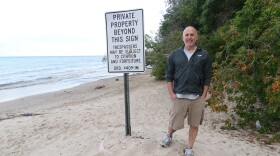-
A Madison-based environmental law firm filed an appeal to Milwaukee Circuit Court on behalf of the Shorewood resident who received a citation for walking the shoreline beyond this public beach.
-
A judge ruled Wednesday that a Shorewood man was guilty of trespassing when he walked along the Lake Michigan beyond the public beach last summer. The man says he'll appeal the decision.
-
The Trump administration wants to make it easier for infrastructure and energy projects to get off the ground. It sees dismantling a foundational environmental law called NEPA (National Environmental Protection Act) as one way to make that happen.
-
We revisit a few of the environmental change-makers we met in 2025. In big and small ways, they’re trying to make a difference in their Wisconsin communities.
-
Wisconsin boasts about 400 miles of Lake Michigan shoreline. But a dispute in the village of Shorewood brings up an age-old question: who has access to that shoreline?
-
Data centers are known for using huge amounts of water. Is that water usage regulated? If so, by whom?
-
The Door County Maritime Museum's curator and exhibits manager looks back on the story of the SS Edmund Fitzgerald, 50 years after it sank in Lake Superior
-
David Zurick's new book "The Third Coast: America's Great Lakes Shoreline" highlights the cultural & natural landscapes of the Great Lakes, where he grew up.
-
Great Lakes economist John Austin looks at the economic divide in the region and how it might be bridged.
-
The Ojibwe and other tribes made their home on Madeline Island for years before European contact. “Passages” shares the story of the Ojibwe’s journey to this prophesied island as told through their ancestors' eyes.
Play Live Radio
Next Up:
0:00
0:00
Available On Air Stations








